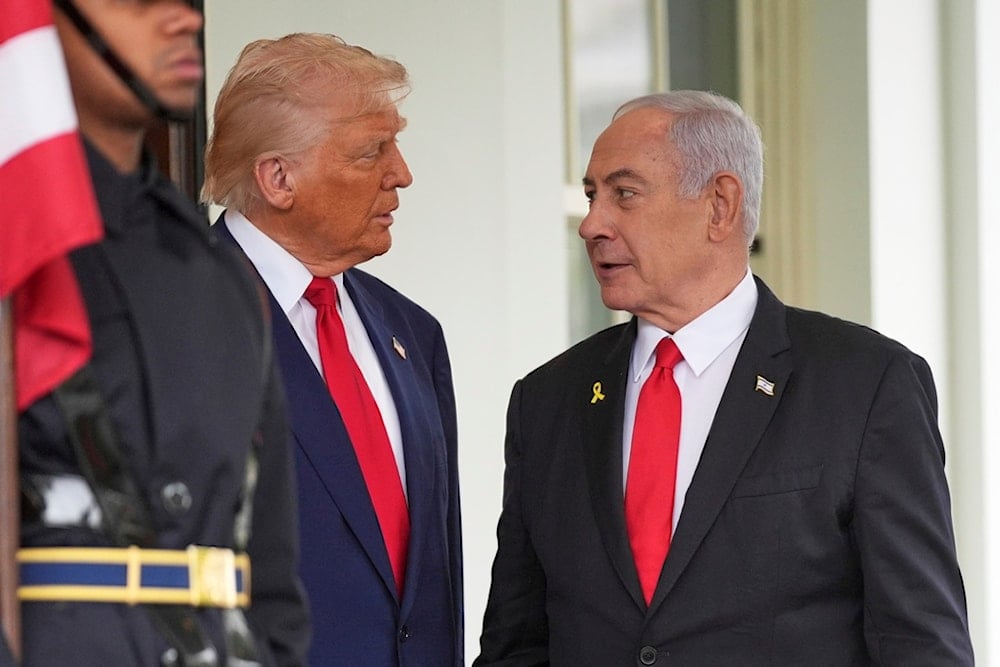'Israel' concerned US may drop Iran uranium enrichment demand: WSJ
As nuclear talks continue, "Israel" fears the US may ease demands on Iran's uranium enrichment, weakening its stance and limiting options for military strikes.
-

President Donald Trump, left, greets Israeli Prime Minister Benjamin Netanyahu at the White House, Monday, April 7, 2025, in Washington. (AP)
"Israel" is expressing growing concern that the United States, in its push to finalize a new nuclear agreement with Iran, may compromise on critical terms that it considers non-negotiable, according to The Wall Street Journal.
According to the report, Israeli officials worry that Washington may sideline key demands, particularly those concerning Iran’s uranium enrichment, in order to keep talks on track.
This concern comes as US President Donald Trump confirmed earlier this week that he had advised Prime Minister Benjamin Netanyahu against taking military action that could undermine diplomatic efforts.
Uranium enrichment at the heart of the dispute
Both Washington and Tel Aviv have publicly emphasized that a future deal with Iran must include an end to all uranium enrichment activity. US special envoy Steve Witkoff has labeled this a “red line” that the administration will not cross.
However, Iran has remained firm in its position that it enriches uranium solely for civilian energy purposes and will not accept a deal that demands a complete halt. The WSJ said that Israeli officials believe the US may eventually drop the enrichment condition to salvage a broader agreement.
Doubts over possibility of a deal that bars enrichment
The WSJ cited European and former American officials, who previously participated in negotiations with Iran, as expressing doubts about the US administration’s ability to reach a deal that denies Tehran any enrichment capability.
Meanwhile, Israeli efforts to pressure the US into a tougher negotiating stance and to preserve the option of a military strike against Iranian facilities have led to “frustration at the White House,” as both sides work to establish a framework outlining the principles of the agreement.
A senior American official told the newspaper that the US is preparing to present a "terms sheet" to Iran that includes halting enrichment, adding, "If they don’t accept these terms, it’s not going to be a good day for the Iranians."
Netanyahu warns against 'bad deal'
Netanyahu has long warned that “a bad deal is worse than no deal,” a sentiment that reflects "Israel's" skepticism over the ongoing nuclear talks. Nonetheless, analysts cited by the WSJ noted that without US support, "Israel" would face significant difficulty in mounting any effective military operation against Iran’s nuclear infrastructure.
Some disagreements between the US, 'Israel' over talks
A senior US official acknowledged ongoing disagreements between the two allies regarding how to approach the nuclear talks.
There are "some disagreements with Israel over how to approach this right now," the official told WSJ.
Despite these differences, the same official hinted that US support for military action might still be possible should talks collapse.
'Israel' planned to attack Iran, postponed strike at Trump's request
The Wall Street Journal reported, citing a source described as familiar with "Israel’s" planning, that the Israeli occupation had planned to launch an attack on Iran this year but postponed it at the request of the Trump administration to allow room for talks.
According to the newspaper, Western and Israeli officials said a military strike could delay Iran’s nuclear program by at least a year. However, there are “significant doubts about the impact any Israeli attack might have on Iran’s program," including its enrichment facilities and stockpile of highly enriched uranium.
While "Israel" is reportedly concerned that an agreement “may not be good enough” and that it might lose another opportunity to address the Iranian nuclear issue in depth, according to Raz Zimmt, a senior researcher at "Israel’s" Institute for National Security Studies, US officials said Washington hopes the framework of a potential deal will address these concerns and convince "Israel" to refrain from attacking Iran.
'Israel' will not resort to military action without US approval
The Wall Street Journal also noted a broad consensus in "Israel” on the need to be able to act "independently" toward Iran, regardless of the outcome of the talks.
While some in "Israel" believe it must move forward against Iran’s nuclear program even without US support, as long as the opportunity is there, the newspaper warned that such a move “would alienate its key ally.”
Moreover, such an action could render an Israeli attack "less effective or difficult to pull off without American military help, including vital American assistance in fending off any large-scale Iranian military response to an Israeli attack."
Against this backdrop, Zimmt suggested that "Israel isn’t going to go for a military option without American agreement."
Read more: Gulf leaders urge Trump to avoid Iran strike, support diplomacy: Axios

 5 Min Read
5 Min Read









